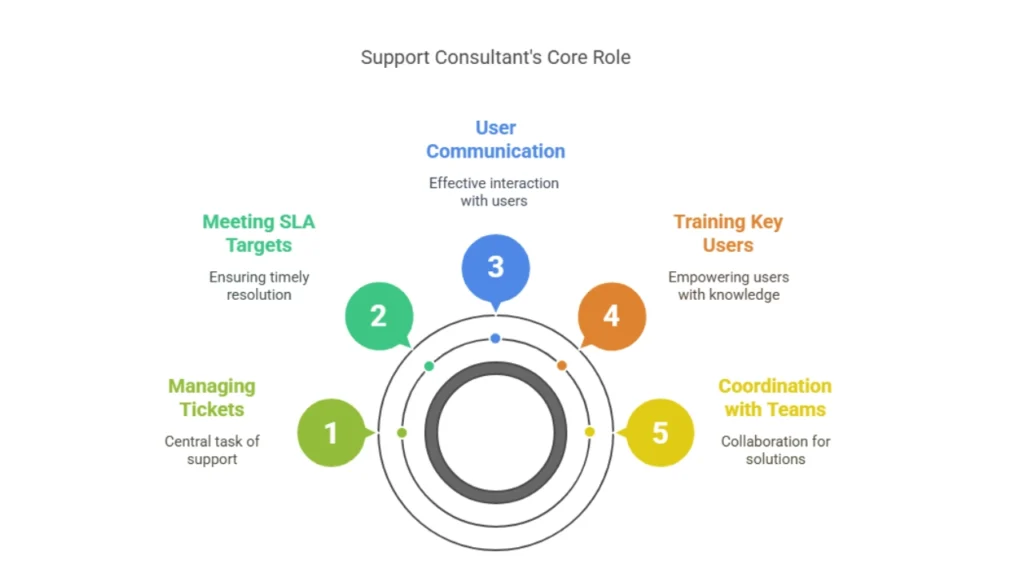Understand what a Change Request in SAP means and explore the key responsibilities of an Application Support Consultant in handling CRs effectively.

What is a Change Request in SAP?
A Change Request in SAP refers to a formal request raised by an end user or business stakeholder after the system has gone live. It typically involves modifying, enhancing, or adding new functionality to the existing SAP configuration.
These requests are common in support projects, where the implemented solution may require improvements based on changing business needs, process optimizations, or newly identified gaps. For example, a user might ask for a new field in a report or additional validation logic in a transaction.
Before implementing any Change Request, the SAP consultant must evaluate its potential impact on the system. This includes checking how the change may affect existing transactions, reporting logic, master data, and integration with other modules.
Steps Before Implementing a Change Request
A Change Request in SAP isn’t executed immediately. A structured process is followed to ensure the stability of the SAP system:
- Requirement Gathering – The consultant meets the user to understand the exact change required.
- Impact Analysis – They assess whether the change affects other modules or processes.
- Effort Estimation – Time, resources, and complexity are evaluated.
- Approval Process – The proposed CR is submitted to management or process owners for approval.
- Development and Testing – Once approved, the consultant coordinates with ABAP and testing teams.
- Deployment – After successful testing, the change is moved to the production environment.
This structured approach prevents business disruptions and ensures that the system continues to meet evolving requirements without introducing errors or instability.
Roles and Responsibilities of an Support Consultant
An SAP Application Support Consultant plays a crucial role in managing day-to-day operations, handling Change Requests, and maintaining system stability. Their responsibilities go beyond just ticket resolution. Here’s a breakdown:

1. Managing Tickets
The consultant monitors and works on open tickets raised by end users. Each ticket is prioritized based on the Service Level Agreement (SLA) and business impact. High-priority issues like system errors are handled immediately, while minor ones are scheduled.
2. Meeting SLA Targets
SLA compliance is a core performance metric. The consultant must regularly review open and closed tickets, ensure that issues are addressed within agreed timelines, and proactively work towards meeting monthly SLA targets.
3. User Communication
Effective communication is vital. The consultant must clearly explain resolutions to end users, understand their challenges, and provide feasible solutions. They should also have the ability to convince users when certain requests cannot be implemented due to system limitations.
4. Training Key Users
Whenever a new Change Request is implemented, consultants are responsible for training key users. This ensures smooth adoption of new functionalities and reduces the number of repetitive queries.
5. Writing Functional Specifications (FS)
For any new development or modification, the consultant prepares a Functional Specification document. This outlines the business logic, data requirements, and expected outcomes. It serves as a guide for ABAP developers to build the required functionality accurately.
6. Coordination with ABAP and Functional Teams
Consultants collaborate with ABAP developers to test and implement CRs. They also work with other functional consultants like SAP FI, MM, or SD when a CR involves cross-functional processes.
Why Change Requests Matter in SAP Support
Change Request in SAP ensure the SAP system remains aligned with changing business goals. Without CRs, organizations would struggle to stay competitive or adapt to regulatory and operational changes.
For consultants, managing CRs showcases their understanding of business processes, SAP modules, and technical coordination. It is also a core part of ensuring long-term SAP system success post-implementation.
Conclusion
Change Request in SAP are a standard part of SAP support projects and play a key role in adapting the system to real-world business requirements. Application Support Consultants are the bridge between end users and system functionality, ensuring that every change is planned, tested, and implemented responsibly.







